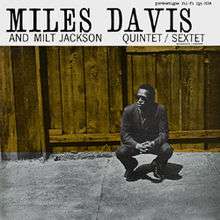Quintet/Sextet
| Quintet/Sextet | ||||
|---|---|---|---|---|
 | ||||
| Studio album by Miles Davis and Milt Jackson | ||||
| Released | 1956 | |||
| Recorded |
August 5, 1955 Van Gelder Studio, Hackensack | |||
| Genre | Jazz | |||
| Length | 31:01 | |||
| Label |
Prestige PRLP 7034 | |||
| Producer | Bob Weinstock | |||
| Miles Davis and Milt Jackson chronology | ||||
| ||||
Miles Davis and Milt Jackson Quintet/Sextet, also known as Quintet/Sextet and sometimes also as Miles Davis and Milt Jackson, is an album which compiles recordings made for Prestige Records on August 5, 1955 by Miles Davis.[1] Credited to "Miles Davis and Milt Jackson", this was an "all-star" session, and did not feature any of the members of Davis's working group of the time (Sonny Rollins, Red Garland, Paul Chambers and Philly Joe Jones). Jackie McLean only plays on his own compositions.
Background and recording

After the release of the Blue Moods, a collaboration with Charles Mingus on which Davis only participated to pay back the fees to Mingus,[2] Davis recorded with his new band in New York's Café Bohemia. The band included the young Sonny Rollins (saxophone) as well as the backing band consisting of Red Garland, Paul Chambers and Philly Joe Jones, who were later hired for his Miles Davis Quintet with John Coltrane. Coltrane, however, did not play in the August studio for the current working band, but with the "All Star" lineup, with Milt Jackson (vibraphone), Percy Heath (bassist) and Art Taylor (drums). Davis also hired the pianist Ray Bryant, because he wanted a bebop sound.
Together with Milt Jackson and Percy Heath, Davis recorded with Thelonious Monk during the 1954 winter session (Miles Davis and the Modern Jazz Giants). Art Taylor was back then a kind of a "house drummer" for the Prestige label. Sonny Rollins was replaced with the young alto saxophonist Jackie McLean, who arranged the two compositions on which he played, "Dr. Jackle" and "Minor March", the latter the only up-tempo tune in that session. "Minor March" was later renamed to "Minor Apprehension" and included on his 1959 Blue Note album New Soil.
The tune "Dr. Jackle" shows McLean's connection with the blues as well as with Charlie Parker, Miles is in a typical lyrical position and Ray Bryant plays in soul-driven, dancy fashion. "Minor March" has rhythmical breaks and a bridge, showing similarities with Bud Powell's "Tempus Fugit"; McLean's cadentials and screams anticipate the style of the future Blue Note recordings.
Miles Davis commented critically in his autobiography to the saxophonist's style:
| “ | Jackie was so high at this session that he was always scared he could not play anymore. I don't know what's the shit was all about, but I have never hired Jackie after this session. | ” |
It was the last joint session by Miles Davis and Percy Heath as well as the only striking performance by pianist Ray Bryant, who arranged the composition on "Blues Changes" (later renamed to "Changes"). Davis plays trumpet with a mute on this track, which has a typical romantic-tranquil mood. Thad Jones' composition "Ditty Bitty" is characterized by Bryant's playing style of blues, gospel and bebop.
Reception
| Professional ratings | |
|---|---|
| Review scores | |
| Source | Rating |
| Penguin Guide to Jazz | |
| Allmusic | |
| The Rolling Stone Jazz Record Guide | |
Quintet/Sextet received overall positive reception. Davis' biographer Peter Wießmüller said that this album is "way more straightlined and intensive than Blue Moods, released four weeks prior", and "the pendulum in Miles' stylistical progression hits to the direction of the experimential workup of the bebop into a closed hardbop concept, and conservative as well as progressive elements are getting fused with each other; (...) the subtile arrangements of Blue Moods are yielded towards a certain expressive hardness".[6]
The saxophonist McLean is encouraged from his background musicians to markedly long and phantastic solo plays in the typical arrangements of "Dr. Jackle" and "Minor March". The short session is revived through "the excellent vibraphone play by Milt Jackson and Jackie McLean's extroverted alt phrasing, which emphasizes Bird's heritage more than before, greatly revive the musical scene."[7]

Critics Richard Cook and Brian Morton awarded the album 4 out of 5 stars in Penguin Guide to Jazz. Scott Yanow from Allmusic only gave the album 3 out of 5 stars, and stated it was "one of the most obscure of [Davis'] Prestige recordings", but its quality is still "fairly high". He named "Dr. Jackle" and "Minor March" as his highlights.[4]
Track listing
- "Dr. Jackle" (Jackie McLean) – 8:55
- "Bitty Ditty" (Thad Jones) – 6:37
- "Minor March" (Jackie McLean) – 8:18
- "Changes" (Ray Bryant) – 7:11
Performers
- Miles Davis – trumpet
- Milt Jackson – vibraphone
- Jackie McLean – alto saxophone
- Ray Bryant – piano
- Percy Heath – bass
- Art Taylor – drums
References
- ↑ At JazzDisco
- ↑ Brian Priestley. Mingus: A Critical Biography. London 1985, p. 75
- ↑ Cook, Richard; Brian Morton; "Review: Quintet / Sextet". Penguin Guide to Jazz
- 1 2 "Miles Davis and Milt Jackson Quintet/Sextet - Allmusic". Allmusic. Rovi Corporation. Retrieved 3 June 2012.
- ↑ Swenson, J. (Editor) (1985). The Rolling Stone Jazz Record Guide. USA: Random House/Rolling Stone. p. 58. ISBN 0-394-72643-X.
- ↑ Wießmüller, p. 105.
- ↑ Wießmüller, p. 106.
- Richard Cook & Brian Morton. The Penguin Guide to Jazz on CD 6th edition. ISBN 0-14-051521-6
- Miles Davis, Quincy Troupe: Miles, the Autobiography: Simon and Schuster, 1990. ISBN 9780671725822
- Dan Morgenstern: Liner Notes. CD issue of Chronicle - The Complete Prestige Recordings
- (In German) Eric Nisenson: Round about Midnight - Ein Portrait von Miles Davis. Wien, Hannibal, 1985 ISBN 3-85445-021-4
- (In German) Peter Wießmüller: MIles Davis. Oreos, Schaftlach, 1985